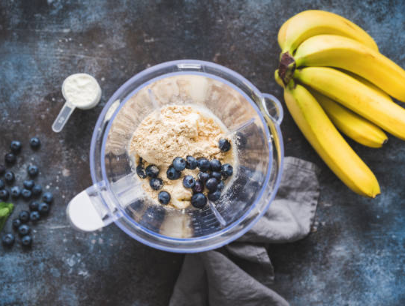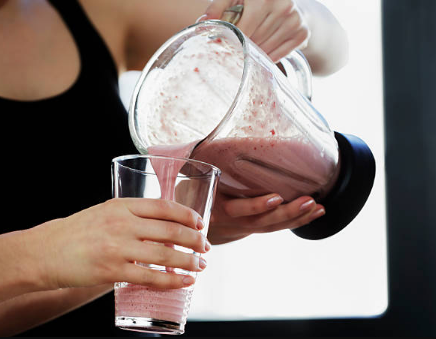Protein powder and creatine are two of the most popular supplements in the fitness industry. People often use them together to build muscle and improve athletic performance. However, there is some confusion about when and how to take these supplements and whether they are effective for weight loss.
Here, we explore the difference between creatine and protein powder, their benefits and side effects, and how to use them effectively to achieve your fitness goals. So, can protein and creatine be taken together? Let’s take a look!
What is Creatine?
Creatine is a naturally occurring compound that is produced in the body from amino acids and is mainly found in the liver, kidneys, and pancreas. It plays a vital role in the production of adenosine triphosphate (ATP), which provides energy for muscle contractions. As a result, creatine supplements are a popular choice for athletes looking to improve strength, explosiveness, and muscle mass.

A common question is whether it’s better to take creatine before a workout or with protein. Studies have shown that it doesn’t necessarily matter when to take creatine as long as it’s taken consistently every day. However, some people prefer to take it with a pre-workout supplement for energy, while others prefer to mix it with protein to support muscle growth and recovery. If you’re considering taking whey protein and creatine at the same time, there’s no harm in doing so. They complement each other well and support muscle growth and recovery. However, whey protein naturally does not contain creatine, so creatine supplementation alone is essential. Additionally, creatine supplementation may have potential side effects, such as water retention and gastrointestinal upset.
Benefits of Creatine:
1. It improves muscle strength and strength.
Creatine has been shown to improve muscle strength and strength, especially during short-term, high-intensity exercises such as weightlifting and sprinting. For example, one 6 study found that creatine supplementation for 12 weeks resulted in an 8% increase in strength compared to the placebo group. Another study in the Journal of the International Society of Sports Nutrition found that creatine supplementation increased power output during resistance training by 14%. These benefits aren’t limited to men, with a study in women finding that creatine can improve maximum strength for upper body exercises.
2. It may support women’s health.
The benefits of creatine for women’s health don’t stop there. “The health benefits of creatine for a woman’s lifetime seem to be profound,” Dr. Susan Kleiner, an authority on sports nutrition, told Mindbodygreen. “Promising studies include reproductive health and fertility, hormone-related changes, and management across the lifespan, bone health and osteoporosis, sarcopenia, brain health, mood, and cognition, to name a few.”
3. It may increase muscle mass.
Creatine supplements have also been shown to increase muscle mass, especially when combined with resistance training. However, this benefit may be more pronounced for individuals who are new to resistance training or have low initial muscle mass.
4. It can improve cognitive function.
Studies have found that creatine supplementation can improve cognitive function, especially tasks that require short-term memory and reasoning. For example, a 2019 study found that creatine supplementation for six weeks improved working memory in healthy young adults. In addition, an earlier study found that creatine supplementation improved cognitive function in older adults, which may help reduce age-related cognitive decline.

Dr. Tim Ziegenfuss, Researcher and CEO of the Center for Applied Health Sciences, stated,”Creatine supplementation has been shown to improve memory, increase bone mass (density), and enhance mood and cognition. “These effects are particularly pronounced among vegans and those who don’t regularly consume meat, which is a major source of dietary creatine.”
5. It can promote brain health and mood.
Some studies have shown that creatine supplementation can protect neurons from damage and increase energy availability in the brain, thereby reducing the risk of neurological diseases such as Parkinson’s and Alzheimer’s. Creatine has also been linked to improved mood and overall health. For example, one study found that creatine supplementation improved women’s self-reported well-being. Another study found that creatine supplementation improved depressive symptoms in individuals treated with antidepressant medications.
6. It may support bone health.
Finally, creatine supplementation may have a positive impact on bone health, especially in postmenopausal women. Some studies have shown that postmenopausal women who supplement with creatine can increase bone mineral density and improve bone strength. These findings suggest that creatine supplementation may be an effective intervention for the prevention of osteoporosis and age-related bone loss.
How It’s Different from Protein Powder?
1. Works
Creatine and protein powder have different functions in the body. Creatine helps fuel muscles during short, high-intensity activity, while protein provides the building blocks for muscle growth and repair. “Creatine is a natural compound found primarily in meat consumed by athletes and is used to improve athletic performance and increase lean body mass, strength, and explosiveness. Protein powders, on the other hand, are often derived from milk, certain plants, or soybeans and are used to build and repair muscle tissue,” Ziegenfuss explains. “When taken orally, creatine neutralizes appetite, while protein suppresses (reduces) appetite, helping dieters feel fuller and reduce their food intake,” he added.
2. Functions
Creatine is a molecule made up of amino acids, while protein powder is a mixture of different amino acids. As a result, creatine is typically consumed in smaller amounts than protein powders and is often mixed with other ingredients. In contrast, protein powders are typically consumed in larger quantities and can be used as a meal replacement.
3. Timing
Creatine is typically taken before or after a workout to maximize its benefits, while protein powder can be taken throughout the day to support muscle growth and recovery. However, some people also take both medications before or after a workout.
4. Benefits
Creatine and protein powder have different effects on the body. Creatine is primarily used to improve athletic performance and increase muscle mass, while protein powder is used for muscle growth and repair, as well as weight management and satiety19. In addition, creatine has been shown to have potential benefits for brain health11 and bone density, especially in women, while protein powder has been linked to improved immune function.
5. Side effects
Creatine has been linked to mild side effects such as water retention, weight gain, stomach upset, and muscle cramps, while protein powder can cause digestive issues such as bloating and gas. However, these side effects are usually rare and mild, and both supplements are considered safe when taken in the recommended doses.

6. Dosage
Creatine intake is usually smaller, with a loading phase of 20 to 25 grams per day22 for the first week, followed by a maintenance dose of 3 to 5 grams per day. Conversely, protein powders are typically consumed in larger amounts to meet daily protein requirements, with a recommended daily intake of 0.8 to 2 grams per kilogram of body weight23, depending on your activity level and fitness goals. Following the dosage recommendations for both supplements is essential to maximize their efficacy and minimize potential side effects.
Use Creatine
The standard dose of creatine is 3 to 5 grams per day, which can be taken all at once or divided throughout the day. Most creatine powders can be dissolved in water, juice, or shakes. It is essential to follow the recommended dosage on the supplement label and not exceed the dosage. The timing of taking creatine is also important. Many experts recommend taking it immediately after exercise to maximize absorption and uptake into the muscles. It can also be taken with meals containing carbohydrates to enhance its absorption. Some people choose to cycle creatine for a few weeks and then take a break to prevent the body from becoming insensitive to creatine.
When buying creatine, it’s crucial to choose a reputable brand with high-quality ingredients. Look for products that have been third-party tested and certified to ensure their purity and potency. Also, make sure that the creatine you choose is in the form of creatine monohydrate, as this is the most researched and effective form.
“Compared to all other forms of creatine on the market, I recommend creatine monohydrate. It is cheap, effective, and safe for long-term use. Ziegenfuss suggested. While creatine is generally safe and well tolerated, it is important to be aware of potential side effects, including stomach upset, dehydration, muscle cramps, and a small amount of temporary weight gain. However, these side effects are usually mild and can be minimized by staying hydrated and following recommended dosage guidelines.
Use Protein Powder
The ideal protein intake depends on weight, age, and activity level, but in general, experts recommend that most people need at least 100 grams of protein per day. Protein powder can help you with this, and you can add it to shakes, smoothies, coffee, and certain foods like oatmeal and pancakes. When it comes to timing, it’s best to consume 25 to 30 grams of protein at each meal and snack to maintain muscle mass and satiety. Regarding the dosage, it is essential to follow the manufacturer’s instructions and not exceed the recommended amount. For people with pre-existing conditions, consuming too much protein can lead to digestive discomfort, dehydration, and kidney problems.
When shopping for protein powder, it’s crucial to check the ingredient list and choose one with a high-quality protein source and minimal added sugars or artificial ingredients. “Protein powder should contain all the essential amino acids and at least 2.5 grams of leucine,” Ziegenfuss says. He also recommends looking for options that contain at least 20 grams of protein per scoop. Whey protein is a popular choice because it’s a complete protein that contains all the essential amino acids and can be quickly absorbed by the body. However, people who are lactose intolerant or allergic to dairy products may prefer plant-based protein powders such as peas and soy.
Use Them Together
Combining creatine and protein powder (e.g., in the same pre-workout shake) can create a synergistic effect, with each supplement complementing each other to maximize the benefits of both worlds. One study found that combining creatine and protein resulted in a more significant increase in muscle mass and strength than taking each supplement alone. The combination of creatine and protein can enhance muscle protein synthesis and muscle fiber growth, which can improve muscle strength and mass. Ultimately, individual outcomes may vary, and the best approach depends on your specific goals and needs.